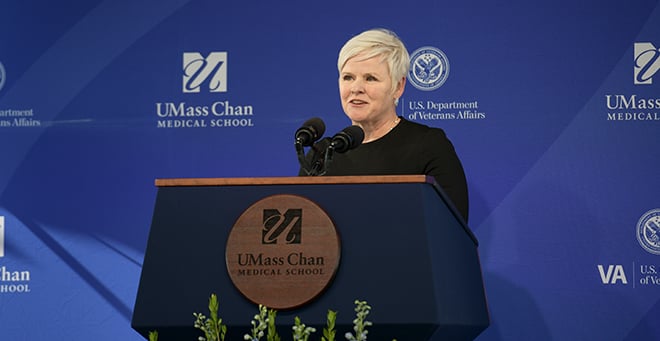A new Veterans Administration pilot project aims to reduce non-medically necessary cesarean section deliveries and improve birth outcomes among women veterans of color by providing pregnancy, labor and postpartum support from trained lay professionals known as doulas.

for the new VA clinic on the UMass Chan campus.
The $225,000, 18-month grant from the VA’s Health Services Research & Development Service, led by Kristin Mattocks, PhD, MPH, professor of population & quantitative health sciences and associate dean for veterans affairs at UMass Chan Medical School, will target pregnant women veterans of color in Durham, North Carolina, and New Orleans, Louisiana, sites that reported the highest C-section rates in a larger, ongoing study. Dr. Mattocks hopes the pilot will demonstrate the feasibility of expanding coverage of doula services for further study and ultimately policy change nationwide.
Over the past decade, the number of pregnant veterans utilizing VA maternity care benefits for their pregnancies has increased exponentially, with the VA paying for nearly 42,000 deliveries during that time, Mattocks explained.
As part of the standard VA maternity benefit, veterans are provided with a maternity care coordinator to help them navigate health care services both inside and outside the VA and provide education and support. While the VA maternity care coordination program offers support to veterans during pregnancy, veterans are not provided labor and delivery support through this program.
When Mattocks and her colleagues were looking at data in their 2015 Center for Maternal and Infant Outcomes Research in Translation (COMFORT) study, they found that C-section rates for Black and Hispanic veterans were roughly twice the rate than that of white veterans, particularly in the South.
“The average C-section rate in the United States is around 32 percent,” Mattocks said. “We were seeing rates for Black veterans of between 40 and 60 percent, with one site where we saw almost 69 percent of Black veterans having C-sections. And then white veterans hovered around 30 percent.”
Mattocks said studies have shown that doula care during labor and delivery can help mothers with decision making and give them a voice, which can reduce the prevalence of C-sections and associated maternal outcomes related to undergoing major surgery. Postpartum support from doulas can aid the transition to new motherhood.
“Doulas don’t actually deliver the baby, but provide emotional and mental support coaching, empowering women to say what it is they want and what it is they need,” said Mattocks. “We were motivated from finding in some of our other work that when we talked to women in the South about why they had a C-section, many of them said they weren’t really given a choice. Even if there was a medical reason, it wasn’t explained well to the women. A lot of women, especially women of color, just aren’t listened to; and it’s the preference of the clinician.”
Mattocks added that providing emotional support during pregnancy and birth would be particularly helpful to women veterans, a number of whom have experienced hardships like sexual trauma, rape and harassment in the military; post-traumatic stress disorder; and other mental health conditions.
Legislation has been filed in recent years to expand VA maternity benefits to cover doula care, but Mattocks said the big issue is the evolution of an institution that is 90 percent male. She hopes the pilot project will provide data to guide the VA’s path.
“It’s been a really big culture change to make the VA a more friendly place for women, and it has gotten a lot better,” said Mattocks. “But this is another example of ways that I think we need to think more carefully about how to care for all women veterans, who might have different needs based on race, class, income and ethnicity.”
Related stories on UMassMed News:
Kristin Mattocks to serve as associate dean for veterans affairs at UMass Medical School
UMMS, VA launch first ever VA study of women’s maternal health care